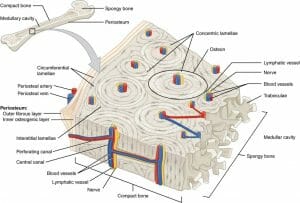Compact bone, also called cortical bone, is the hard, stiff, smooth, thin, white bone tissue that surrounds all bones in the human body. It is also called osseous tissue or cortical bone and it provides structure and support for an organism as part of its skeleton, in addition to being a location for the storage of minerals like calcium. About 80% of the weight of the human skeleton comes from compact bone. Spongy bone is the other basic bone type which is protected by the compact bone that surrounds it.
Compact Bone Structure
The basic units of compact bone are called osteons or Haversian systems. These are cylinder-shaped structures that have a mineral matrix and are home to osteocytes (mature bone cells) that are trapped in the matrix. Lamellae are formed by osteons that align themselves in a parallel orientation to form layers along the long axis of the bone. The small open spaces created in the lamellae by the osteocytes are called lacunae. Canaliculi are small channels that create a network between the lacunae to aid in the diffusion of material between the bone cells. The lamellae create circular canals called Haversian canals that contain nerves and blood vessels
Formation of New Compact Bone
The parallel orientation of osteons along the high-stress areas of compact bone provides strength to help resist bending or fracturing. If a bone does suffer a fracture, the creation of compact bone is one of the last steps in the repair process. Newly-formed compact bone has a woven appearance and does not contain any osteons. As the bone matures, it undergoes a remodeling process eventually leading to the creation of osteons and other structures found in mature compact bone.

The image above shows the structure of compact bone.
References
- Bone. (n.d.). Retrieved October 1, 2017 from https://courses.lumenlearning.com/boundless-biology/chapter/bone/
- Bone Tissue. In Wikipedia. Retrieved October 1, 2017 from https://en.wikipedia.org/wiki/Bone_tissue
